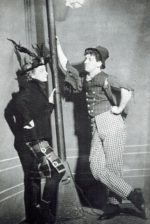There are dozens of professional theatres in rural and small town Ontario, presenting hundreds of plays to tens of thousands of people. Summer theatre is an economic engine, part of a cultural and creative sector that contributes $12 billion a year to the provincial economy. It’s hard to imagine a time when summer theatre was considered a bold new idea, when there was just one summer stock company in the province – perhaps even the whole country.
It wasn’t that long ago, though – 1934, and in the small Muskoka village of Bala an actor named John Holden launched what a Toronto paper called “Stock in the Sticks.”
“The summer theatre business has apparently struck our fair province at last,” the Mail and Empire newspaper wrote, calling it “an interesting experiment.” In six weeks The Good Companions theatre troupe performed four different plays in the village, attracting an audience of 1,264 people.
Weekly stock theatre, wasn’t new: it was called “straw hat” in the U.S, where it had been thriving for a decade or more. Holden and many other Canadian actors earned their living doing weekly stock in the U.S., and he saw no reason it couldn’t work here.
Most small towns already had theatre buildings, many of them quite grand. But they were fading. Live theatre seemed to be dying in the face of movies, and most of the theatre buildings were used for community events, amateur musical evenings, and American touring shows.
Launching a professional company in a small town was a gamble, particularly at the height of the Depression, but it paid off. That summer, the actors in The Good Companions theatre each earned eleven dollars and eleven cents for the entire six week season on top of their living expenses, which included an allowance of cigarettes. And best of all, they had been able to do what actors crave: perform theatre in front of a live audience.

Babs Hitchman and John Holden on stage in 1936. That year, their company was the only one in North America doing weekly stock. (Photo reprinted from Straw Hats and Greasepaint by Scott McLellan)
The next year, the company was renamed The Actors’ Colony Theatre. They performed nine plays and more than doubled their audience. The next year they grew again. They began to spend winters in Toronto and Winnipeg, and at times were the only professional theatre company in either city.
John Holden wouldn’t have used the term “cultural tourism,” but that’s exactly what he had begun developing. The audiences in Bala weren’t primarily local residents: he was in Muskoka, which even then was cottage country. The people who came to see his shows were, for the most part, cottagers and resort guests who decided that a night out at the theatre was the perfect complement to a day of swimming or boating or relaxing on the dock. Their homes were in Toronto and Pittsburgh and Detroit; being able to see a show while on holiday made Muskoka a more attractive destination.
That same spirit pervades much of the summer theatre world today. A vibrant theatre can be a powerful draw for a small town. Stratford, Shaw and Blyth are obvious examples of towns where the theatre is a major employer. But nearly every professional theatre in the province has a symbiotic relationship with the tourism economy: having a theatre brings in visitors, and having visitors helps a theatre thrive. Arts and culture tourists of all kinds contributed $3.7 billion to Ontario’s economy in 2010, creating 67,000 jobs and bringing in $1.5 billion in tax revenue. And while summer theatre reflects just a small part of that, it’s still a significant contributor. Today’s audiences may include far more people from nearby towns than they did in Holden’s day, but the mix is still recognizable.
Holden’s plays were light fare, mainly comedies, melodramas, and mysteries. A similar mix dominates summer theatre programming today, but directors are also willing to take risks and present more challenging works. Nor do they rely solely on annual trips to New York to see what plays could be adapted to the summer stage: theatres have discovered that audiences are hungry for locally relevant fare. Canadian playwrights who once had to rely on staged readings and fringe festivals as their only way of getting their work seen are now being commissioned to write a new piece for a small theatre company, or work with a director to turn a fringe festival one act into a full-blown production. The summer theatres have matured into an important place for us to tell our own stories.
Still, economic realities have always been a consideration. Holden’s staging, sets and lighting were kept simple, because there just wasn’t time to do anything complicated. Each show opened on a Wednesday night, and after that night’s performance the actors were given the scripts for the next week’s show. They had to learn their lines and their blocking, as well as build and paint the sets during the days, then go on stage and perform that night. Once a week they packed up the entire set and took it on the road for a single show in another town (Gravenhurst at first and then at Bigwin Resort on Lake of Bays.)
It was a blistering pace, yet most of the actors loved it. Holden was a committed professional, and he wanted every show to be polished to perfection. He was also beginning to see the Actors’ Colony Theatre as a place to train new Canadian actors and even help revive professional theatre. Actors like Robert Christie, Mavor Moore, Jane Mallett and William Needles honed their talents in the Actors’ Colony. “I think before John’s arrival it was pretty hard to make any distinction between who was amateur and who was professional,” Christie told a journalist in the 1980s. “I personally didn’t experience anything like this in Canada again until I was with the Stratford company. It had to do with discipline. There isn’t the same discipline in an amateur show… and I think only the people who care a lot are willing to subject themselves to that professional discipline.”
The Actors’ Colony Theatre folded not long after the Second World War broke out, but the seed had been planted. Holden had shown that there was an audience for summer theatre: it was possible to produce professional theatre in small towns and not go bankrupt. After the war, theatre companies began springing up across the province. There was even a new Actors’ Colony Theatre running in Bala for five years in this century, and while it has been dormant for a season, professional shows are now found just down the road in Gravenhurst.
Summer theatre in Ontario has become a serious part of the landscape, as Holden knew it could. A mix of passion and professionalism has become expected: few actors build their own sets; a new show will run for more than a week; and people don’t get paid in cigarettes any more. Summer theatre is on the ascendant again. It’s a vital, vibrant art form, and it makes Ontario a richer, more engaging place for residents and visitors alike.
To learn more about the Actors’ Colony Theatre, read Straw Hats and Greasepaint by Scott McClellan.

Blogger Andrew Wagner-Chazalon
Jayme Armstrong as Elle Woods and cast, Legally Blonde: The Musical, St Jacobs County Playhouse, 2014, Photo by Hilary Camilleri
Spring has finally sprung and with this change of weather comes the highly anticipated beginning of the summer theatre season. We are lucky to have a wide-ranging and dynamic summer theatre scene in the province of Ontario. Big venue, small space, outside, indoors, lakeside or travelling by bus, there’s something for everyone and we’re excited to see what the 2014 summer season brings!
There has been a frenzy of activity and energy in our association this year. We have gone through a transformation process, emerging on the other side with an updated look, feel, and even a NEW NAME. From this point forward, the group (formerly ASTRO) will be known as Ontario Summer Theatre, keeping what we do best at the heart of our name.
Country Jukebox: The Best of Country Duets at Port Stanley Festival Theatre, with Aaron Solomon and Leisa Way
Along with this shiny new name you will find a new logo and this fantastic website for you to check out! The website features a dynamic blog where you can find stories on individual theatres, side-trips, and unique things to do as you venture out to see productions this summer. It is your go-to resource for a fun and savvy insiders-look at the summer theatre scene. We encourage you to check back regularly to read new experiences as the season progresses.
In the meantime, explore our Theatre Map page, where you’ll find a complete listing member theatres and an interactive map, so you can start planning your own summer adventure.
When the sun shining, the fields are green and blue lakes surround you, can you think of a better way to spend an afternoon or evening than at a summer theatre?
]]>